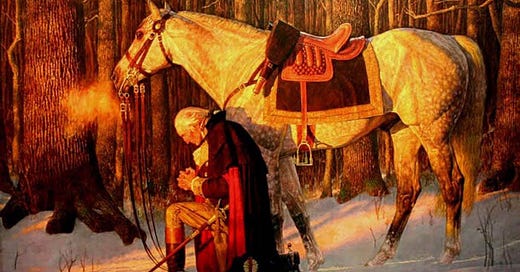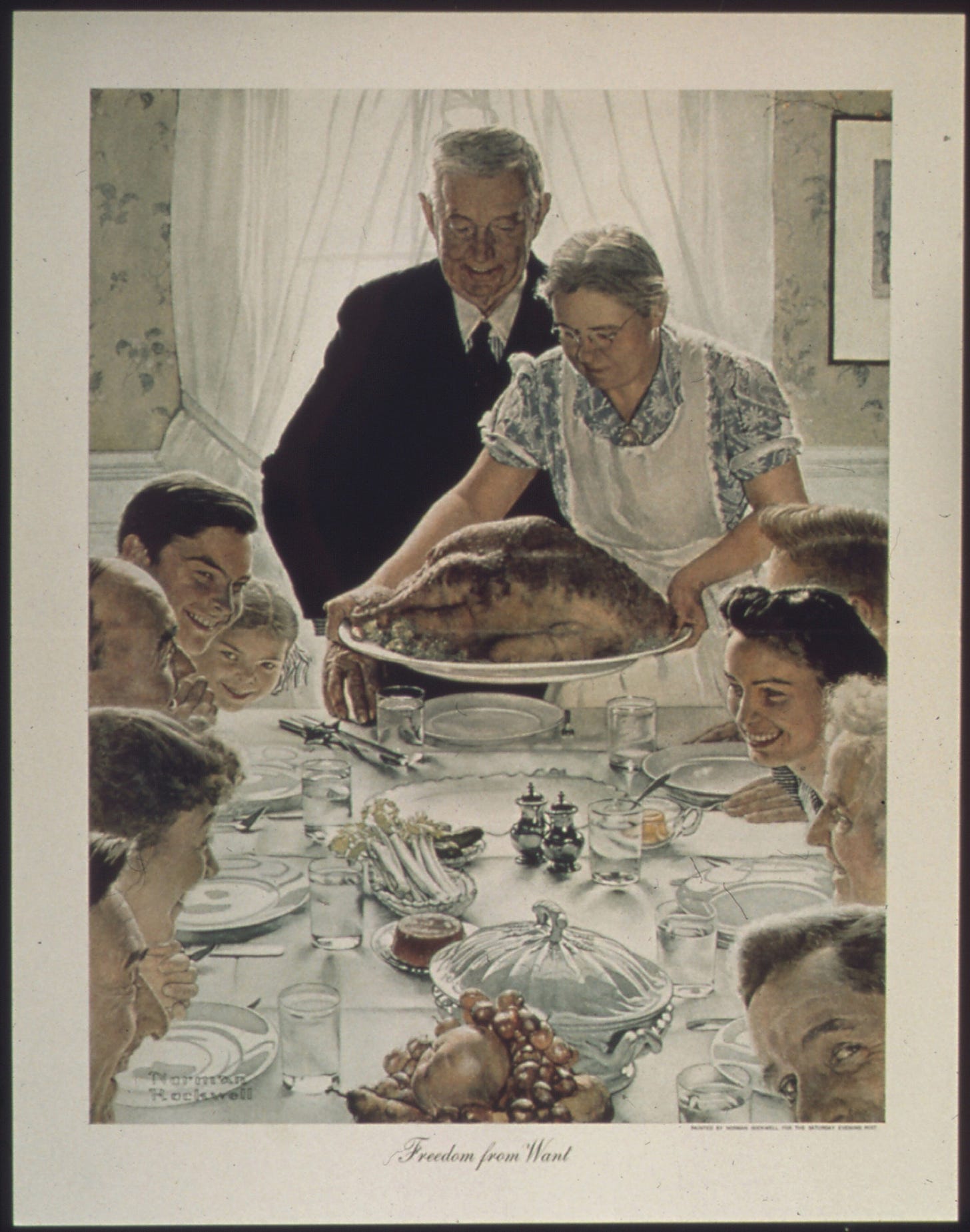Hello friends, I hope you all had a lovely Thanksgiving Day. Today, as we eat leftovers, shop deals, and consider putting up Christmas decorations, I would like to take a moment to discuss the importance of Thanksgiving, both as an attitude and as a memorial to our founders.
Thanksgiving is a uniquely American holiday. Yes, I know other countries celebrate it as well, but the idea of setting aside a day to give thanks to God not only for our material needs but for our freedoms stemmed from the experiences of our fathers in the New World. The Jamestown colony was established in Virginia in 1607, where the colonists faced disease and starvation, but persevered. The Plymouth colony was established in Massachusetts in 1620, and the survivors of the Mayflower faced the same hardships. The alliance that developed between Virginia and Massachusetts created America, as the two colonies led the way in winning our War of Independence against Great Britain, fought each other in a bloody Civil War, and then reconciled in time to build the greatest nation in human history in the 20th century.
I’ll invite the late, great, Rush Limbaugh to tell the story of the First Thanksgiving:
By the 19th century, even those we consider our nation’s founders themselves looked back to the Pilgrim Fathers as the true creators of America. Early Americans revered these men, honoring their sacrifices that enabled the creation of a new nation. In 1802 future President John Quincy Adams commemorated the landing of the Pilgrims at Plymouth with an oration extolling their virtues:
The founders of your race are not handed down to you, like the fathers of the Roman people, as the sucklings of a wolf. You are not descended from a nauseous compound of fanaticism and sensuality, whose only argument was the sword, and whose only paradise was a brothel.
…
Their glory has not been wafted over oceans of blood to the remotest regions of the earth. They have not erected to themselves colossal statues upon pedestals of human bones, to provoke and insult the tardy hand of heavenly retribution.
But theirs was "the better fortitude of patience and heroic martyrdom." Theirs was the gentle temper of Christian kindness; the rigorous observance of reciprocal justice; the unconquerable soul of conscious integrity.
John Quincy Adams, “Oration at Plymouth” December 22, 1802
This devotion to the first men and women from England who began building what would one day be the United States of America is diminished today. Indeed, we were so busy with Covid and the George Floyd riots that we almost entirely forgot the 400th anniversary of the Pilgrims’ landing in 2020. The social justice movement of the 21st century has actively tried to bury the history of the Pilgrims in favor of a more inclusive history that paints the Native American Indians as victims and the Pilgrims as oppressors, in true Marxist fashion.
Author Christopher Caldwell called this out in 2020 in a great essay for the Claremont Review of Books:
At work is more than a failure to summon the Pilgrims to mind. There is an active project to exorcise them, in order that the country might find itself a past more congruent with its present-day political commitments. A year ago, the New York Times launched a “1619 Project” dedicated to the proposition that the original, the more consequential, and therefore the real founding of the country came with the arrival of a Portuguese slave ship in Jamestown the year before the Pilgrims arrived.
…
Over time, the intended result is reached: authorities cannot teach the story of the Pilgrims even if they would, because most of them no longer know it. The story of the settlement of North America has become a scandal. It is worth looking more closely at who the Pilgrims were, and what they did, to understand why so many people have grown so uncomfortable telling their story.
Christopher Caldwell, “Plymouth Rock Landed on Them” Fall 2020
While I believe it is important to understand and appreciate the stories of other cultures, especially when they interact with our own histories, there is something shameful about being made to denounce or forget the stories and legends of our own ancestors. The story of the Pilgrims is the founding story of America, and this was understood by all Americans until just the past few decades.
It is no surprise that the erasure of the Pilgrims at Plymouth coincides with an erasure of gratitude in general. As our country becomes less Christian, our people have started to forget our God from whom all blessings flow. Without a spirit of gratitude flowing from our leaders, the population too becomes entitled and resentful. It was not always so.
President George Washington issued the first national proclamation of Thanksgiving Day on the fourth Thursday of November in 1789. Though he did not mention the Pilgrims by name, he clearly associated a day of thanksgiving for the new nation with the famous thanksgiving feast shared by the Pilgrims with their Wampanoag neighbors.
Whereas it is the duty of all Nations to acknowledge the providence of Almighty God, to obey his will, to be grateful for his benefits, and humbly to implore his protection and favor-- and whereas both Houses of Congress have by their joint Committee requested me to recommend to the People of the United States a day of public thanksgiving and prayer to be observed by acknowledging with grateful hearts the many signal favors of Almighty God especially by affording them an opportunity peaceably to establish a form of government for their safety and happiness.
George Washington, “Thanksgiving Proclamation” October 3, 1789
In 1863, with the Civil War raging and no end in sight, President Lincoln renewed Washington’s call to set aside the fourth Thursday of November as a day to give thanks to God not only for food and health but for the freedom that all Americans cherished.
It has seemed to me fit and proper that they should be solemnly, reverently and gratefully acknowledged as with one heart and one voice by the whole American People. I do therefore invite my fellow citizens in every part of the United States, and also those who are at sea and those who are sojourning in foreign lands, to set apart and observe the last Thursday of November next, as a day of Thanksgiving and Praise to our beneficent Father who dwelleth in the Heavens.
Abraham Lincoln, “Proclamation of Thanksgiving” October 3, 1863
We still celebrate Thanksgiving today, and many people still set aside time to declare their thanks to Almighty God for the blessings He has given them. However, as a nation, Thanksgiving Day is not about gratitude. It is about gluttony. It is about consumerism. It is about television. The idea of gratitude especially has become quaint and old fashioned in our culture today, replaced by an idea of entitlement, a demand that those who have surrender to those who have not. Major political movements are built on the basic vices of jealousy and envy.
Indeed, not only are jealousy and envy promoted today, but so are strife and division. When I was in school, we were taught that Thanksgiving represented a moment of peace and harmony between the very different cultures of the Pilgrims and the Wampanoag Indians. Today, children are taught that Thanksgiving was the onset of genocide, as the evil white Europeans plotted the extinction of the noble Native Americans. How can we hope for any reconciliation in the future when we have a faction deliberately instigating strife?
As we look around our world at all the problems that we face today, it is important to cultivate a sense of gratitude. We are materially better off than our ancestors could have ever dreamed, even when you account for inflation. We live with comforts and conveniences that even the greatest kings of old never knew. We have the ability to communicate with friends and strangers alike at any distance in an instant, and despite the problems with social media it has allowed us to build communities that span the globe.
We truly have a lot to be thankful for. Consider that the Pilgrim Fathers had endured disease and starvation that killed half their population, yet they still gave thanks to God for what they had. Abraham Lincoln issued his proclamation of thanksgiving in the midst of a war that would eventually kill 600,000 American soldiers and many more civilians who would die of disease and privation. We should not complain about our own situation, but instead be thankful to God for what we have.
As this year draws to a close, I invite you to cultivate gratitude for what you have, trust in God for what you lack, and honor our ancestors who came before us, who created the nation that we are fighting for today. I hope you had a lovely Thanksgiving Day, and I wish God’s blessings on you all in the season to come.






Thanks for the history and commentary, Brian. If we are to be a nation and a people we must protect our borders, our language and our culture. These are the targets of the Left. While today we are a diverse population our national cultural practices came generally from Western Europe, or were founded here. We must continue them and protect them.
As a boy growing up in Tulsa, (OK) in the 1950s we learned the Maypole Dance in Elementary school, celebrating May Day. The music teacher and PE teach taught it to us. As boys, we hated it because it was "girlie." But now I smile back on it, and then frown that it is likely gone from our practices and traditions.